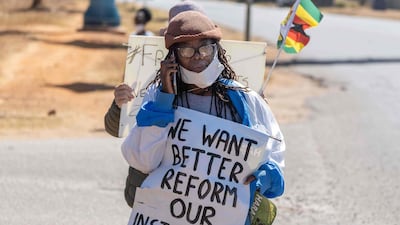Police in Zimbabwe on Friday arrested internationally-acclaimed novelist Tsitsi Dangarembga as they enforced a ban on protests coinciding with the anniversary of President Emmerson Mnangagwa's election.
Booker Prize nominee Ms Dangarembga, 61, was taken away in a police truck as she demonstrated in the upmarket Harare suburb of Borrowdale alongside another protester.
Streets in the centre of the city were largely deserted as police and soldiers set up checkpoints to prevent entry.
Opposition politician Jacob Ngarivhume, head of a small party called Transform Zimbabwe, had called for demonstrations against alleged state corruption and the country's slumping economy
The protests were timed to coincide with the second anniversary of Mr Mnangagwa's election, which the opposition says was a fraud.
Many people stayed at home after police on Thursday issued a ban and warned of a tough response.
"All security arms of government are on full alert and will deal decisively with any individuals or groups fomenting violence," it warned.
There were more checkpoints and roadblocks than usual on roads leading to the centre of the capital, manned by police and soldiers.
In the central business district, police carrying batons or riot shields were heavily deployed, an AFP journalist saw.
In the suburbs, only a handful of people appeared to brave the ban.
An AFP photographer saw Dangarembga and a fellow protester, Julie Barnes, hauled into a truck full of police armed with AK-47 rifles and riot gear.
"Arrested! At Borrowdale. Ope it will be OK," she tweeted.
She also tweeted a photo of herself and Ms Barnes, sitting on the floor at a police station
She had been carrying placards calling for reforms and the release of Hopewell Chin'ono, a prominent journalist arrested last week under a government crackdown.
"It seems that there has been a big reaction by the authorities to this protest," she said moments before her arrest.
"They declared it illegal -- I'm not quite sure (why), apart from the fact that they don't want it...Our constitution gives Zimbabweans the right to demonstrate peacefully and that's what we are doing."
The Cambridge-educated author is the only Zimbabwean woman writer to win the Commonwealth Writers' Prize and has often been praised for speaking out on women's issues.
She leapt to prominence in 1988 with "Nervous Conditions", a coming-of-age story about a girl's battle to escape poverty and gain an education. The book became an instant classic.
Her arrest came days after her latest novel, "This Mournable Body," entered the long list for the Booker Prize.
In a statement, police confirmed she had been arrested "for trying to incite the public to engage in illegal demonstrations while carrying placards written various political messages meant to cause public disorder."
Among several others arrested on Friday was Fadzayi Mahere, a lawyer and spokeswoman for the main opposition, the Movement for Democratic Change-Alliance.
Ms Mahere live-streamed via Facebook images of riot police scaling metal barriers into a suburban eatery where she had retreated after her protest, and arrested her.
"Very concerned about reports of abductions, arrests and threats targeting those exercising constitutional rights. Freedom of expression is vital even in times of Covid-19, with social distancing observed," the British ambassador in Harare, Melanie Robinson tweeted.
The UK's Minister for Africa, James Duddridge MP, said he was very concerned.
"Concerned by reports of arrests during anti-corruption protests in Zimbabwe today. Urge Government of Zimbabwe to ensure all human rights are upheld as guaranteed by the constitution
@UKinZimbabwe," he tweeted.
The government had denounced the protests, calling them an "insurrection".
Ruling ZANU-PF spokesman Patrick Chinamasa earlier this week claimed that US ambassador Brian Nicholls was sponsoring the protests and called him "a thug".
Mr Mnangagwa took over from longtime ruler Robert Mugabe after a coup in November 2017.
But hopes among many that he would end Mugabe's disastrous economic slump have been dashed, and many Zimbabweans say they are worse off than before.
The UN's World Food Programme (WFP) says some 8.6 million Zimbabweans, 60 per cent of the population, will require food aid as a result of a drought, economic crisis and the Covid-19 pandemic.
The country has recorded 3,092 virus cases including 53 deaths.


